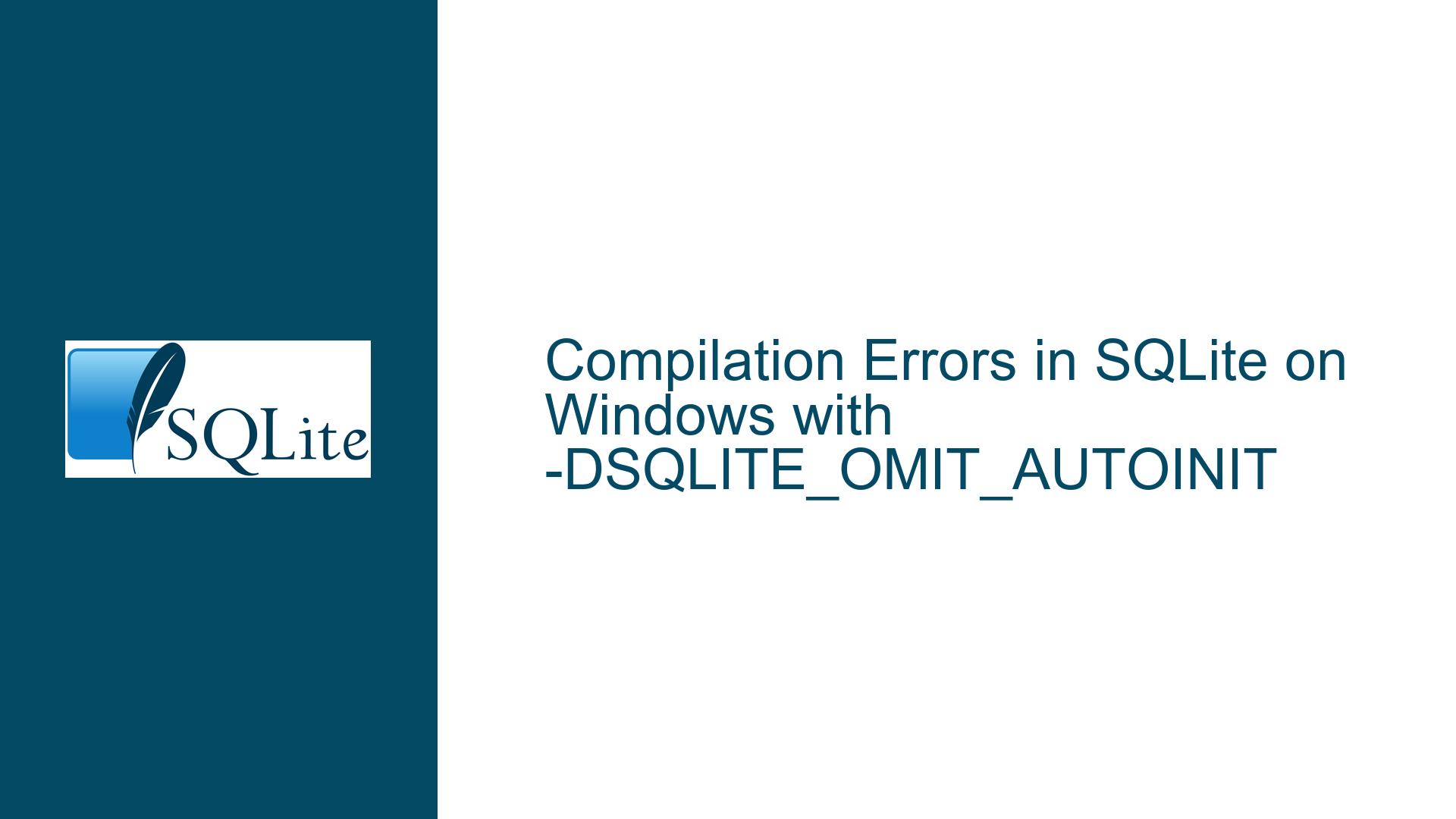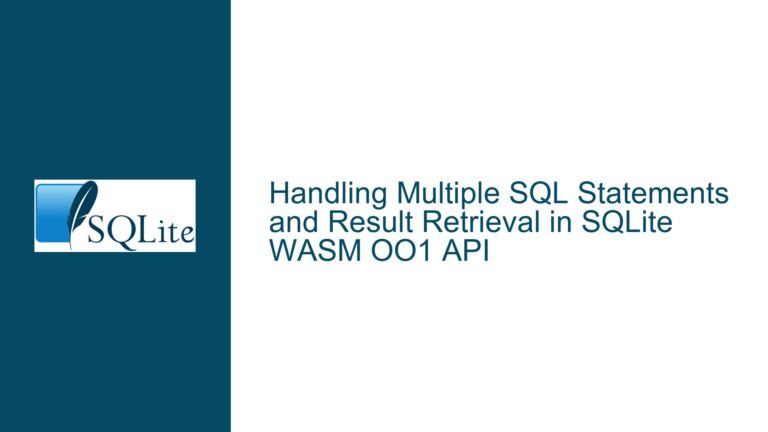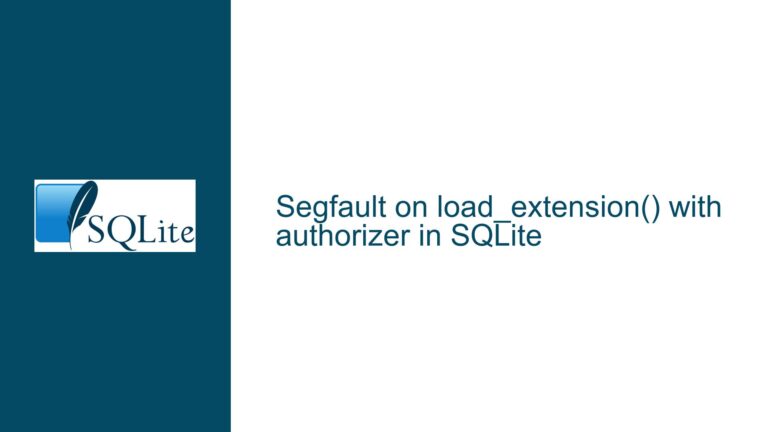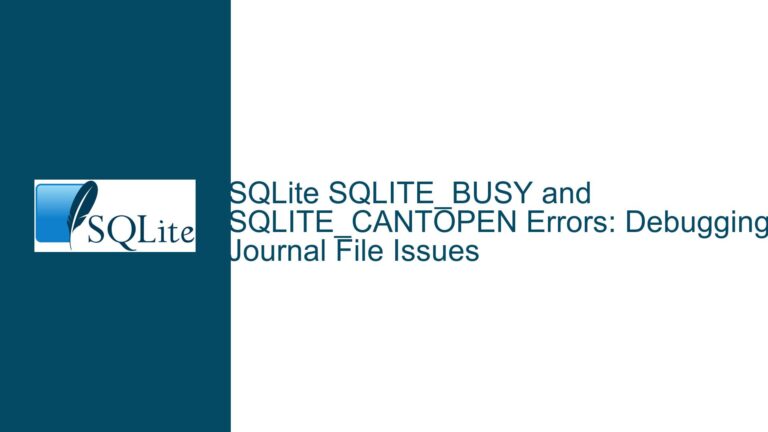Compilation Errors in SQLite on Windows with -DSQLITE_OMIT_AUTOINIT
Issue Overview: Compilation Errors Due to Undeclared Variable bRc in SQLite Source Code
When attempting to compile SQLite version 3.39.3 on a Windows system using the -DSQLITE_OMIT_AUTOINIT flag, the compilation process fails with a series of errors related to an undeclared variable bRc. The errors occur in the sqlite3.c file, specifically around line 45520, where the variable bRc is referenced without prior declaration. The compilation process also generates a warning about the variable bRc being set but not used earlier in the code. The root cause of this issue lies in the conditional compilation directives within the SQLite source code, particularly around the SQLITE_OMIT_AUTOINIT flag, which omits the automatic initialization of the SQLite library. This omission leads to the variable bRc being undefined in certain code paths, causing the compiler to throw errors.
The problem is exacerbated by the fact that the -DSQLITE_OMIT_AUTOINIT flag is designed to remove the automatic initialization routines from the SQLite library, which can lead to unexpected behavior if the code is not carefully structured to handle this omission. The issue is further complicated by the use of multiple other compilation flags, such as -DSQLITE_DEFAULT_MEMSTATUS=0, -DSQLITE_DQS=0, and -DSQLITE_ENABLE_FTS5, which may interact with the -DSQLITE_OMIT_AUTOINIT flag in ways that are not immediately obvious. The compilation errors are not merely superficial; they indicate a deeper issue with how the SQLite source code is structured when certain features are omitted.
The warning about the variable bRc being set but not used earlier in the code suggests that there may be redundant or dead code in the SQLite source, which could be contributing to the problem. The warning is a clue that the variable bRc is being defined in a section of the code that is not being executed, or that its value is not being utilized in a meaningful way. This redundancy could be a result of the conditional compilation directives, which may be causing certain code blocks to be included or excluded in a way that is not entirely consistent with the intended behavior of the SQLite library.
The compilation errors are not limited to a single instance of the variable bRc; they occur in multiple places within the sqlite3.c file, indicating that the issue is widespread and not confined to a single function or code block. This suggests that the problem is systemic and may require a more comprehensive solution than simply declaring the variable bRc in a single location. The errors also highlight the importance of careful code review and testing when using conditional compilation flags, as these flags can introduce subtle bugs that are difficult to detect without thorough testing.
The issue is further complicated by the fact that the compilation process is being performed using the Clang compiler, which may have different behavior compared to other compilers such as GCC or MSVC. The Clang compiler is known for its strict adherence to the C standard and its ability to detect subtle issues in code, which may explain why the errors related to the variable bRc are being flagged. However, this also means that the issue may not be immediately apparent when using other compilers, making it more difficult to diagnose and resolve.
In summary, the core issue is a compilation error caused by the undeclared variable bRc in the SQLite source code when the -DSQLITE_OMIT_AUTOINIT flag is used. This error is a result of conditional compilation directives that omit certain code paths, leading to the variable being undefined in critical sections of the code. The issue is further complicated by the use of multiple compilation flags and the Clang compiler, which may introduce additional complexities that need to be addressed.
Possible Causes: Conditional Compilation and Variable Scope Issues in SQLite
The primary cause of the compilation errors is the interaction between the -DSQLITE_OMIT_AUTOINIT flag and the conditional compilation directives in the SQLite source code. The -DSQLITE_OMIT_AUTOINIT flag is designed to omit the automatic initialization routines from the SQLite library, which can lead to unexpected behavior if the code is not carefully structured to handle this omission. In this case, the flag causes the variable bRc to be undefined in certain code paths, leading to the compilation errors.
The variable bRc is used in several places within the sqlite3.c file, but its declaration is conditional on the presence of the SQLITE_OMIT_AUTOINIT flag. When the flag is defined, the declaration of bRc is omitted, leading to the errors. This is a classic example of a variable scope issue, where the scope of a variable is not properly managed across different code paths. The issue is exacerbated by the fact that the -DSQLITE_OMIT_AUTOINIT flag is not the only flag being used; other flags such as -DSQLITE_DEFAULT_MEMSTATUS=0 and -DSQLITE_DQS=0 may also be affecting the behavior of the code.
Another possible cause of the issue is the use of the Clang compiler, which may have different behavior compared to other compilers. The Clang compiler is known for its strict adherence to the C standard and its ability to detect subtle issues in code, which may explain why the errors related to the variable bRc are being flagged. However, this also means that the issue may not be immediately apparent when using other compilers, making it more difficult to diagnose and resolve.
The warning about the variable bRc being set but not used earlier in the code suggests that there may be redundant or dead code in the SQLite source, which could be contributing to the problem. The warning is a clue that the variable bRc is being defined in a section of the code that is not being executed, or that its value is not being utilized in a meaningful way. This redundancy could be a result of the conditional compilation directives, which may be causing certain code blocks to be included or excluded in a way that is not entirely consistent with the intended behavior of the SQLite library.
The issue is further complicated by the fact that the compilation process is being performed on a Windows system, which may have different behavior compared to other operating systems. The Windows operating system has its own set of quirks and idiosyncrasies that can affect the behavior of the code, particularly when it comes to system calls and memory management. This means that the issue may not be immediately apparent when compiling on other operating systems, making it more difficult to diagnose and resolve.
In summary, the primary cause of the compilation errors is the interaction between the -DSQLITE_OMIT_AUTOINIT flag and the conditional compilation directives in the SQLite source code. This interaction leads to the variable bRc being undefined in certain code paths, causing the compiler to throw errors. The issue is further complicated by the use of multiple compilation flags, the Clang compiler, and the Windows operating system, all of which may introduce additional complexities that need to be addressed.
Troubleshooting Steps, Solutions & Fixes: Resolving Undeclared Variable Errors in SQLite Compilation
To resolve the compilation errors related to the undeclared variable bRc in the SQLite source code, several steps can be taken. The first step is to ensure that the variable bRc is properly declared in all code paths where it is used. This can be done by adding a declaration of bRc before the #ifndef SQLITE_OMIT_AUTOINIT directive, as suggested in the original discussion. This ensures that the variable is always defined, regardless of whether the -DSQLITE_OMIT_AUTOINIT flag is used.
The next step is to carefully review the conditional compilation directives in the SQLite source code to ensure that they are properly structured and do not introduce any unintended side effects. This includes checking for any redundant or dead code that may be contributing to the problem. The warning about the variable bRc being set but not used earlier in the code is a clue that there may be redundant code that can be safely removed. Removing this redundant code can help to simplify the code and reduce the likelihood of similar issues occurring in the future.
Another important step is to test the code with different compilers and on different operating systems to ensure that the issue is not specific to the Clang compiler or the Windows operating system. This can help to identify any additional issues that may be introduced by the use of different compilers or operating systems. It is also important to test the code with different combinations of compilation flags to ensure that the issue is not specific to a particular combination of flags.
If the issue persists after taking these steps, it may be necessary to modify the SQLite source code to better handle the omission of the automatic initialization routines. This could involve restructuring the code to ensure that all necessary variables are properly declared and initialized, regardless of whether the -DSQLITE_OMIT_AUTOINIT flag is used. This may require a more comprehensive review of the SQLite source code and a deeper understanding of how the different compilation flags interact with each other.
In addition to these steps, it is also important to consult the SQLite documentation and seek advice from the SQLite community. The SQLite documentation provides detailed information on the different compilation flags and how they affect the behavior of the SQLite library. The SQLite community is also a valuable resource for troubleshooting and resolving issues, as it includes many experienced developers who have encountered and resolved similar issues in the past.
Finally, it is important to document any changes made to the SQLite source code and to thoroughly test the modified code to ensure that it behaves as expected. This includes testing the code with different combinations of compilation flags, different compilers, and different operating systems. It is also important to document any issues that are encountered during the testing process and to seek feedback from the SQLite community on how to resolve these issues.
In summary, resolving the compilation errors related to the undeclared variable bRc in the SQLite source code requires a careful review of the conditional compilation directives, the removal of redundant or dead code, and thorough testing with different compilers and operating systems. It may also require modifying the SQLite source code to better handle the omission of the automatic initialization routines. By following these steps, it is possible to resolve the issue and ensure that the SQLite library compiles correctly on Windows systems with the -DSQLITE_OMIT_AUTOINIT flag.






